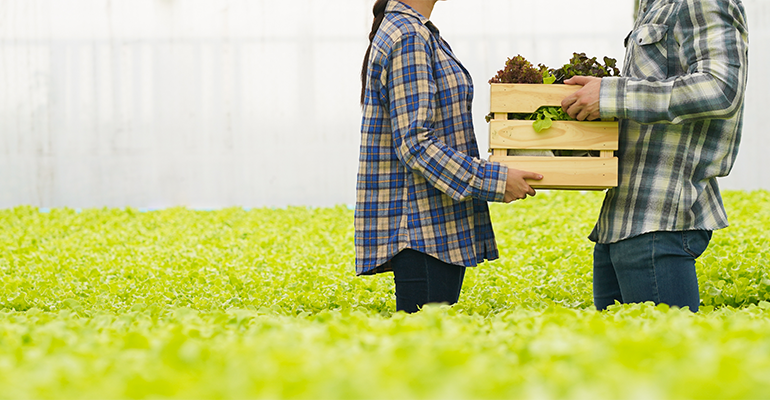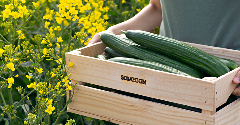News
Metrics matter: Measuring the true price of food for a healthy and sustainable future
13 Jun 2022
Food value chains must begin to price in the ‘externalities’ of production, including impacts on human and planetary health, if the world is to realistically create a healthy and sustainable food supply to feed a growing population, according to one of the top experts at Rabobank.
Speaking at the F&A Next conference in Wageningen, the Netherlands, Berry Marttin, member of the managing board at Rabobank reiterated previous warnings of the challenges the world faces in feeding an estimated 10 billion people by 2050 – noting that the sheer scale of the challenge to produce enough food is being compounded by other factors, including pricing and supply chain issues in the current food supply and the climate crisis.

“We have to be four or five times more efficient at producing each calorie,” said Marttin.
The Rabobank expert noted that the world needs to effectively increase the number of calories being produced globally by 60% in order to feed the expected 10 billion people in the world – adding that the majority of this population growth is expected to be seen in Asia and Africa.
At the same time, however, he warned of the critical importance of staying within a 2°C global warming limit, which would effectively mean not exceeding more than four gigatons of carbon emissions per year.
“Actually, the challenge that we have, is that we need to produce per calorie four to five times more efficiently,” he said. “This is the challenge that we're looking at as society.”
The price isn’t right: Measuring the true cost of food
Marttin noted that in order to talk about value of something, the industry will first need to have the right metrics – warning that in the case of food production, there are currently too many measures and not enough agreement of which ones should be used.
He noted, for example, that simply looking at sustainability based on carbon footprint metrics will skew food choices one way and may result in foods and diets that have lower nutritional value, but that looking solely at nutritional value may also cause a skew towards foods with higher carbon footprints.
Adding water use into the mix adds even more confusion to the metrics, he warned, commenting that it becomes ‘impossible’ to tell which foods are the best to grow, or what the true cost of diets may be to the environment or wider health systems.
“True value is about asking ‘do we really pay for all the externalities that are in the product that we are making?’,” Marttin said, noting that the number one driver of purchase decisions for consumers is price – followed by convenience and taste.
“Look at the difference between beef that can be produced lean with low environmental impact and beef that has actually high impact,” he said. “At the supermarket those two have exactly the same price. Is that right?”
The Rabobank board member noted that since consumers can buy both high and low impact beef very conveniently from most supermarkets, the only real differentiator to purchase could be price.
“What is the incentive [for the farmer] to move from having high impact beef production to go to the low impact?” he said. “There's absolutely zero incentive because there's no payment for it.”
The cost of food externalities to people & planet is ‘huge’
The expert cited data presented at the most recent United Nations Food Systems Summit in New York, which showed that we only pay for approximately one third of the true value of food.
“The true value of food actually has two externalities,” he said – citing both the environmental cost of food production and the impact on human health of food consumption.
“Actually, the cost to society is huge,” he said. “The health impact of not having proper nutritious food is enormous. It’s 12 trillion dollars, which is more than the value of food itself”
Eco-labels and nutrition labels could shift consumer mindsets
Because of this, Marttin noted that changing consumer mindsets and pricing in ‘externalities’ would be key to shifting the conversation on food and pricing.
“Two things are starting to happen. We are already starting to see Nutri score,” he said. “You feel guilty if you buy a D product, right?”
“But the other thing we are starting to see is the eco label,” he said, noting that eco labels are already used in certain Belgian supermarkets.
“The moment that you start crossing nutrition and eco label, it starts to become interesting,” he added, noting that early reports in Belgium show that products with high (A or B) scores on both nutrition and eco labels had a 10%-15% uplift in sales after the labelling system was introduced.
Metrics matter: We need scientific guidance on managing data
Marttin warned that data will become ‘essential’ in the food value chain and noted the need for scientific guidance on how to manage the data process in food value chains.
“We need to get the right metrics going. Because if we want to get true value, we need to know that what are we measuring and how we're measuring.”
“There is a lot of data that will need to be flowing in the value chain,” he said. “How do you measure that? What is it? And how are we going to share data?”
Related news

Soy story: WWF scores UK supermarkets on sustainability efforts
12 Nov 2025
WWF has published its latest “Soy Scorecard”, ranking UK supermarkets’ efforts to combat deforestation and land conversion in their soy supply chains.
Read more
Standing Ovation and Bel scale up casein production from dairy co-products
11 Nov 2025
Foodtech company Standing Ovation has partnered with cheese specialist Bel Group to manufacture dairy serums for industrial-scale casein production via precision fermentation.
Read more
New UPF standard hoped to offer consumers ‘coherence and clarity’
10 Nov 2025
Ingredients companies are being urged to enter “a new era of partnership and innovation” following the launch of the industry’s first non-UPF verification scheme.
Read more
Whistleblowers accuse UK meat industry of promoting cheap, unsustainable supply
7 Nov 2025
An anonymous group of industry insiders has accused the UK’s biggest food companies of systematically driving down meat quality and welfare standards.
Read more
Bord Bia presents Irish dairy ingredient suppliers at Fi Europe
6 Nov 2025
Dairygold Co-operative Society, The Carbery Group, and Ornua Co-operative: Meet with sustainable producers of Irish dairy ingredients at Food ingredients Europe 2025, Hall 7.2 Stand M18.
Read more
AI attraction means foodtech startups must ‘prove’ rather than ‘promise’
4 Nov 2025
Reports suggest that artificial intelligence (AI) is sucking investment from foodtech and agritech, but investors say the picture is complicated.
Read more
Penguin and Club bars no longer classed as chocolate
30 Oct 2025
Penguin and Club bars can no longer be classified as chocolate after the pladis-owned McVitie’s brands turned to cheaper alternatives amid the ongoing cocoa crisis.
Read more
Could plant-based protection replace plastic packaging?
29 Oct 2025
Swedish foodtech company Saveggy has launched an additive-free plant-based protection for cucumbers, offering a waste-free packaging solution for fruit and vegetables.
Read more
Does promoting protein content push up plant-based sales?
27 Oct 2025
Promoting the protein content of meat-free products is a more effective sales strategy than adding carbon labels, a study of UK bakery chain Greggs suggests.
Read more
Amazon Grocery launch aims to balance quality with affordability
22 Oct 2025
Global e-commerce giant Amazon has introduced a new private-label food brand, combining existing Amazon Fresh and Happy Belly products with new everyday items.
Read more